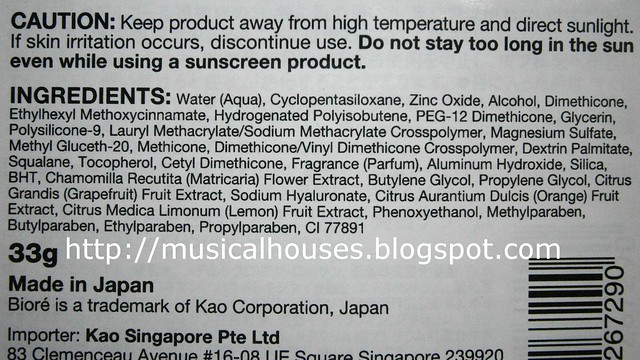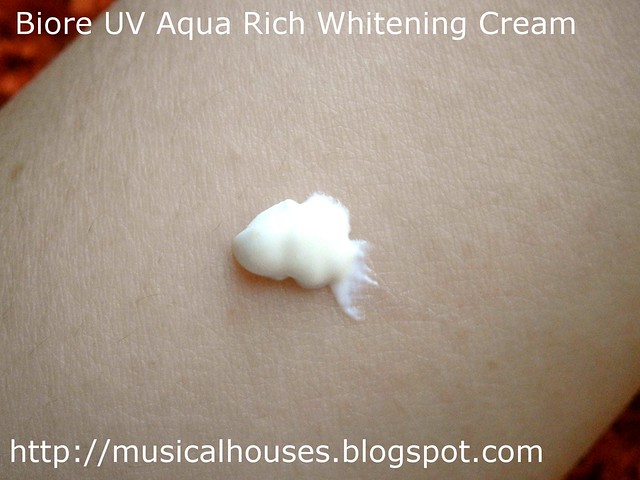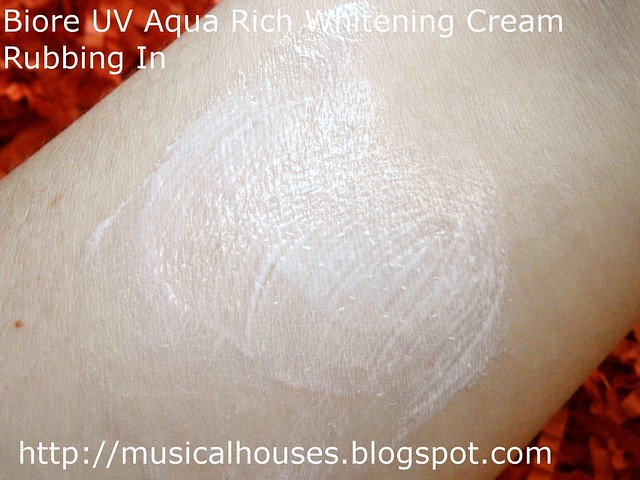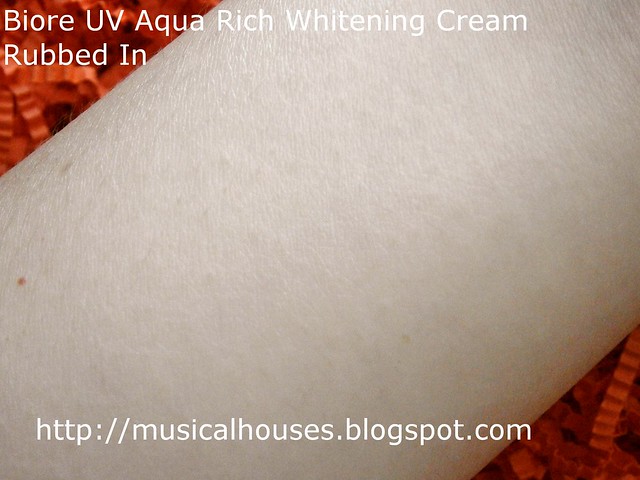If you've read my blog before, you'll know I've reviewed Biore products before on my blog, including one of their other sunscreens. And I've also reviewed other Asian brand (and non-Asian brand) sunscreens too (Sunplay, etc.). And the Biore UV Whitening Cream, to my surprise, struck me as being a little different from all the other Asian-brand sunscreens out there - but in a good way!
The main difference for me was that this actually used a physical sunscreen filter. Most Asian brand sunscreens (particularly Japanese ones) put a great emphasis on the cosmetic elegance of the sunscreen, so they tend to use chemical sunscreen filters exclusively, particularly ethyl methoxycinnamate. While this does make the product they put out feel more light and have a better texture, sometimes it does compromise the sunscreen, as chemical filters are more likely to aggravate sensitive skin than physical filters. (I go into some detail on this in my sunscreen tips post.) But the Biore sunscreen actually uses as its main filter zinc oxide.

I know, I know, I'm a nerd for putting up the ingredients list before the swatches. Don't worry, the swatches are coming!
If you look at the ingredients list, the first sunscreen filter is zinc oxide, followed by ethylhexyl methoxycinnamate (really another name for octinoxate). Zinc oxide, of course, provides both UVA and UVB protection, while octinoxate provides primarily UVB protection. (If you're wondering what types of filters provide what kind of protection, there's also a reference chart in my sunscreen post.) The two remain stable when used in combination with each other, so you know that your sunscreen is photostable. Most other Asian brand sunscreens tend to use only chemical filters, so although none of the Biore marketing materials talk about their sunscreen filters (instead they talk about having citrusy fruit extracts) I feel that this is really a differentiating trait in the Biore UV Aqua Rich Whitening Cream that's worth talking about, because overall, it's less likely than other purely chemical sunscreens to aggravate sensitive skin, and it provides stable broad-spectrum protection.

The creamy-textured Biore UV Aqua Rich Whitening Cream
At this stage, I know what you're thinking: "Seriously, who reviews products by looking at the ingredients list first? You big fat nerd! I want to know how it will feel on my skin!" I stand guilty as charged. Now that I'm all done being a nerd and talking about the sunscreen filters, we can finally talk about the aesthetics of the sunscreen.
Because the Biore UV Aqua Rich Whitening Cream has zinc oxide as its primary sunscreen filter, it translates into a thicker, creamier texture than some of the other sunscreens I've tried, which almost have a watery, fluid texture. Not the Biore UV Aqua Rich Cream. This one has a texture that is more like Western sunscreens, where you have a cream, except that it's not that thick. I'd say it's somewhere in between.

Blending in the Biore UV Aqua Rich Whitening Cream
When you blend it out, it's actually easier to blend than a typical Western sunscreen due to the lighter texture. As you can see in the photos above and below, when it blends out, it doesn't feel sticky and doesn't leave a white residue. It is quite light on the skin, and I think it would be good under makeup since it doesn't feel thick or greasy.
Perhaps the only drawback is that at 50ml a bottle, if you use the recommended 1.5ishml of sunscreen everyday for your face (or 2mg/cm2 of face area - again, my sunscreen post goes into more detail), this won't last all that long. That said, that's another thing I've noticed about Asian brand sunscreens as a whole - they tend to come in these tiny 30ml and 50ml bottles with really high SPF values, and the Biore product is no different. It's SPF 50+ PA+++, so if you're really

The Biore UV Aqua Rich Whitening Cream all blended out!
So, would I recommend this? Yes, I think it's a product that strikes a good balance, using some physical filters while keeping the product light and cosmetically elegant. I think this is a strong product overall, so if you're looking for a good sunscreen for the season, this is a good choice. It would also be good for those who want to try the more cosmetically elegant Asian brand sunscreens but are worried about the potential skin sensitivity, as the zinc oxide used is less likely to aggravate skin than the typical chemical filters in sunscreen.
(Product was sent for review. Review is my complete and honest opinion. I am not affiliated with/compensated by the company.)














I love this stuff! Got three tubes in Tokyo and now I'm out. Maybe I can find it on Amazon....
ReplyDeleteis this suitable for face?
ReplyDeleteis this suitable for face? im looking for a whitening cream with spf that can be use on my dry face. you have any good suggestions?
ReplyDelete@ain trsy: Yes this is suitable for your face as well :) this product is not a whitening cream though, it's just a sunscreen. If you're looking for a whitening cream, most of them use various forms of Vitamin C (like Hada Labo, SKII, Olay and Juju Aquamoist), or arbutin, or a combination of both. If the product has high enough concentrations of either, it should work. You'll want to look for products ideally with either ingredient near the top of their ingredient list. Hope this helps!
DeleteI've search for hada labo's product but they got too many whitening cream n moisturizer that make me having hard time choosing..will you recommmend one of their products? Tq
ReplyDeleteOr other products that are suitable for teen age :)
ReplyDelete@a trsy: Since you mention you're in your teens, I'm going to guess that you probably want something light and non-oily. I've reviewed the Hada Labo Whitening Lotion before and thought it was pretty good (review here: http://musicalhouses.blogspot.com/2013/05/hada-labo-arbutin-whitening-lotion.html ), but more recently I've also been really impressed by Juju Aquamoist's Whitening C line (I reviewed the essence and face cream here: http://musicalhouses.blogspot.com/2014/01/juju-aquamoist-whitening-forme-acne.html but you may prefer the Lotion in the same range instead). If you have oily skin, you may prefer the Juju Aquamoist version as it will probably feel lighter on skin. Hope this helps!
DeleteHi, just wanted to let you know part of your text got cut off on the 8th paragraph.
ReplyDelete